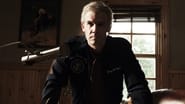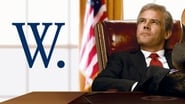zkonedog
When making a semi-biographical film, there really are two ways that one can go about the task. The first method would be to try to be as objective as possible in trying to present all sides of a person's life and public reception equally. Sadly, that method was most definitely not used by Oliver Stone in the making of "W".Upon just a surface-level viewing of the film, one might think that, objectivity-wise, it isn't really too bad. George W. Bush is portrayed both at his worst (the college years) and at his best (the 9/11 response), including pretty much all his important life events in between. Yet, for viewers who did not feel that Mr. Bush was the root of all political evil while in office, they will be able to see the framework from which Stone is portraying our latest departed President.Basically, the #1 problem inherent in "W" is that it clearly takes the stance that Bush is an idiot, no matter what the time period, situation, or office he holds. For example, instead of the strong leadership ability that was the Bush administration's "claim to fame", Stone projects G.W. as a stupid, bumbling idiot who was nothing more than a puppet of a few of his more superior cabinet members (such as Vice President Dick Cheney). Then there is also Stone's take on George W. Bush becoming a born-again Christian. Instead of perhaps even hinting at the fact that Bush might have made a sincere and heartfelt transformation towards God, Stone portrays the revelation as just emboldening Bush to keep blundering through life, as now he supposedly has God to back him up.Unfortunately, those two examples do not stand alone...the entire film is just dripping with the "idiot Bush" mentality. It seems to be as if Stone's thought process behind the film was not "let's make a live-action biography of George W. Bush" so much as "let's show how idiotic Bush is and yet he stills becomes President".Now, with that being said, the movie wasn't (by far) the worst that I have seen in terms of political favoritism/non-objectivity. Essentially, Stone just examines the life of George W. Bush through a single prism: that of a bumbling fool who somehow became President. Is that correct? Who's to say...it's just one possibility. I just wish that Stone would have widened his view a bit.
OneEightNine Media
W. I've been meaning to watch this for a long time now and I finally got the chance. Unfortunately, it is not a good movie. You would think with such prolific director as Oliver Stone, we would get a hard knocked, no hold bars masterpiece which delivers something with more of a punch, especially considering the subject matter but this comes off as a made for television kind of deal. A far, far, farrrrrrr cry from Stone's norm. Maybe he just wasn't allowed to make the movie he wanted. You can tell his heart wasn't in this one. Other than Josh Brolin in the title role, all the other actors reminded me of those actors you see in lame Lifetime movies or something. I have a two word rating for this movie; Skip it.
ElMaruecan82
Everyone who saw Cronenberg's" Dead Zone" remembers Greg Stillson, a charismatic demagogue played by Martin Sheen, speaking the people's language, to finally lead the world to a Nuclear Holocaust just because he believed he had a destiny. This is not to say that George W. Bush played in the same league but the ex-President believed he had a destiny as well, and his tenure also changed the face of the world with September 11 as a convenient excuse. Seven years after the terrorist attacks, Oliver Stone had enough material to give an impartial portrait of then President George W. Bush.Was he the worst? I've often wondered that myself. Well, I don't think as a human being he was, and Stone makes a big effort to make him look genuinely sympathetic with pathetic emphasized, so does Josh Brolin who delivers one of the most underrated performances of the last decade. I think what can be said about W. is that he was the worst President at the worst possible time… his image of a reborn Christian after Clinton's disastrous second tenure earned him the ticket to the White House (although we'll never know what happened with these ballots in Florida) but after his election, there wasn't much to say apart from … the good Christian image and his 'family' background. And then came September 11, and it turned W. into the crusader of the Free World against the Axis of Evil.A movie like "W." might be seen as the attempt from a renowned leftist director to tarnish what's left from a disastrous legacy anyway: a sham war and a real crisis. But there's so much negative stuff to say about "W." that no film was needed for that, any Michael Moore documentary would've done fine. The portrait painted by Stone, if not flattering, is well-balanced and tends to explain how W. conducted the world to the most useless and pointless war whose consequences are still palpable now. It's cleverly structured, almost entertaining, going back and forth between the present and the past, where he had to live under the shadow of a respectable family and the constant burden to prove his father that he was as valuable as his brother Jeb. George wasn't the black sheep of the Family, but a well-meaning guy who wanted to prove his worth in a way or another.This is an interesting case of 'Napoleon' syndrome where the physical strength is replaced by the intellect. Basically, W. had too much to prove with each failure pushing him in the abyss of alcoholism and depression, much to his father's disappointment. George Bush Sr. is played by James Cromwell, who's far taller than the real Bush was, but that gives him an edge over his son, fitting the narrative as he physically towers him, and it's interesting that the only scene where George openly criticizes his choices (not eliminating Saddam Hussein, thus costing him a reelection), George is standing and his father sitting and weeping, waiting for Barbara Bush's consolation (Ellen Burstyn plays the strong-willed matriarch). It's not your usual oedipal case as George is torn between the will to please his father and to get off his shadow.And through his presidency, he succeeds by both honoring and killing his father, symbolically. Josh Brolin plays a wonderful Bush, fully confident in public, but in private, desperate to make the right choice. The two steps that lead to his rebirth were Laura Bush (Elizabeth Banks) who could see the potential of being the woman behind the promising great man, and a disastrous senator's campaign where he was attacked because of his wealthy background and alcoholism. W. understood where the problem came from, and translated his dependence from his father and booze to the Father, the Son and the Holy Ghost, and this became his trademark, something many Americans could respond to. This is a guy whose choices of life were questionable but he openly admitted his mistakes, because he changed. He had a marketing plan all worked up, and the Republicans and conservative warmongers knew his potential. W. remains a naive character in his conviction that he's the one leading the show as his good-Christian facade was the perfect foil to more malevolent intents, magnificently conveyed by Richard Dreyfus' portrayal of Dick Cheney.A lot can be said about the performances, Toby Jones as Karl Rove, Thandie Newton as Condoleeza Rice or Scott Glenn as Rumsfeld, they are all good, and maybe Brolin was in a too-crowded a year to get an Oscar-nomination, but boy, was Dreyfus as Cheney chilling, when he delivers his speech about the necessity to attack Iraq, he's as cold and magnetic as Hannibal Lecter, and the scene is even scarier now that the harm is done. We knew it was all about the oil, we knew there wasn't any massive destruction weapons but September 11, for all the horror and patriotism it resurrected, called for a reaction, and that was the perfect timing to finally get rid of Saddam, and surround Iran. Nature hates emptiness and now, the same scenario is used in Syria, after Libya. And guess what? There wasn't no W., there was the supposedly greatest answer to his years of regression: Barack Obama.The interactions between W. and his team prove that the President hardly matters, it's all about the balance between economical needs and political interests. I guess Obama thought as much as W. that he 'had a destiny', as much as Nixon, who inspired another magnificent political biopic by Oliver Stone. He also had good intentions and we know which way they generally pave to. Obama ends his Presidency leaving a similar thirst for a resurgence of American ideals, exactly what made a President out of W's pedigree. Just imagine what this context can make out of a charismatic billionaire who controls as much as he pleases the media… maybe this time, we'll have our Greg Stillson.






